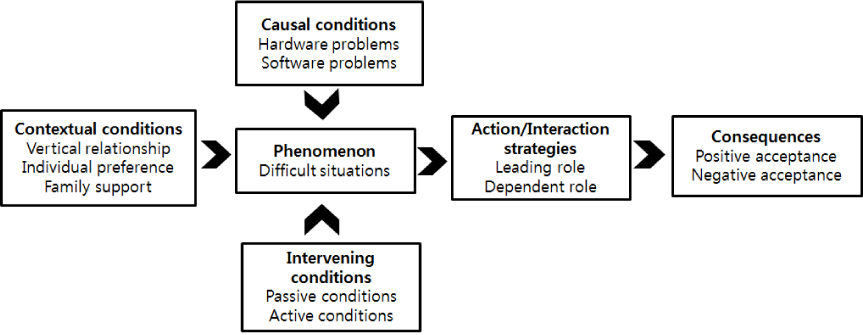J Korean Acad Nurs Adm.
2016 Dec;22(5):437-447. 10.11111/jkana.2016.22.5.437.
Grounded Theoretical Analysis on the Hospital Accreditation Experience of Head Nurses in General Hospitals
- Affiliations
-
- 1Red Cross Nursing College, Chung-Ang University, Korea.
- 2Department of Nursing Science, The University of Suwon, Korea. teddy@catholic.ac.kr
- 3Department of Nursing, University of Ulsan, Korea.
- KMID: 2366999
- DOI: http://doi.org/10.11111/jkana.2016.22.5.437
Abstract
- PURPOSE
The purpose of this study was to conduct a grounded theoretical analysis on the hospital accreditation experience of head nurses in order to understand their behavior on the adaption of this new system.
METHODS
The participants were 8 head nurses with more than 3 years of experience. The data were collected through in-depth interviews using audiotape recording analyzed by the constant comparative method described in Strauss and Corbin's methodology.
RESULTS
There were 113 concepts, 26 subcategories and 12 categories identified through the open coding process. In the axial coding, the following paradigm model was proposed: 1) the causal conditions were "˜hardware problem' and "˜software problem', 2) the contextual conditions were "˜vertical relationship', "˜individual preference', and "˜family support', 3) the intervening conditions were "˜passive conditions' and "˜active conditions', 4) the action/interaction strategies were "˜leading role' and "˜dependent role', 5) the consequences were "˜positive acceptance' and "˜negative acceptance', 6) the central phenomenon was "˜difficult situation' and 7) the core category was "˜leading in harmony'.
CONCLUSION
The new system led head nurses having difficulties as the middleman between the hospital administration and general nurses, but they made a continuous effort to overcome and adapt to it through a number of strategies.
MeSH Terms
Figure
Cited by 1 articles
-
Response Patterns of Nursing Unit Managers regarding Workplace Bullying: A Q Methodology Approach
Jin Kyu Choi, Byoungsook Lee
J Korean Acad Nurs. 2019;49(5):562-574. doi: 10.4040/jkan.2019.49.5.562.
Reference
-
1. Ministry of Government Legislation (KR). Patient safety act. 2015. 01. 28. Act No. 13113.2. Yang NY, Choi JS. Relationships of nurses' perception, nursing performance, job stress, and burnout in relation to the joint commission international hospital accreditation. J Korean Acad Nurs Adm. 2014; 20(1):1–9. DOI: 10.11111/jkana.2014.20.1.1.3. Kim EK, Kang MA, Kim Y, Park JH, Park JH. Opinions and strategies on the national hospital evaluation program. J Korean Acad Nurs Adm. 2007; 13(1):40–52.4. Korea Institute for Healthcare Accreditation. Accredited organizations [Internet]. Seoul: Korea Institute for Healthcare Accreditation;cited 2016 January 19. Available from: http://www.koiha.kr/member/kr/certStatus/certList.do.5. Lee KS, Shin MK. Goals and assignments of healthcare accreditation program in Korea. J Korean Med Assoc. 2012; 55(1):7–16. DOI: 10.5124/jkma.2012.55.1.7.6. Joint Commission on Accreditation of Healthcare Organizations. Joint Commission Resources, Inc. 2012 Accreditation process guide for hospitals. Oakbrooke Terrace, Ill.: Joint Commission Resources;2012.7. Casey MM, Moscovice I. Quality improvement strategies and best practices in critical access hospitals. J Rural Health. 2004; 20(4):327–334. DOI: 10.1111/j.1748-0361.2004.tb00046.x.8. Mead N, Bower P, Roland M. The general practice assessment questionnaire (GPAQ) - development and psychometric characteristics. BMC Fam Pract. 2008; 9(1):13. DOI: 10.1186/1471-2296-9-13.9. Smith EL, Cronenwett L, Sherwood G. Current assessments of quality and safety education in nursing. Nurs Outlook. 2007; 55(3):132–137. DOI: 10.1016/j.outlook.2007.02.005.10. El-Jardali F, Jamal D, Dimassi H, Ammar W, Tchaghchaghian V. The impact of hospital accreditation on quality of care: Perception of lebanese nurses. Int J Qual Health Care. 2008; 20(5):363–371. DOI: 10.1093/intqhc/mzn023.11. Yoo MS, Chung MS. The relationships among the perception of quality assurance and national hospital evaluation program and nursing performance of hospital nurses. J Korean Acad Nurs Adm. 2008; 14(3):260–267.12. Cudney AE, Cox J, Baugh K. Comparing clinical resources and outcomes to understand best practices. J Healthc Manag. 2002; 47(5):287–290.13. Kang SR. The experiences of job stress on head nurses in general hospitals. J Korean Acad Nurs. 2007; 37(4):501–509.14. Yi M, Oh JH, Hwang HM, Kwon EJ, Lee JH, Park EY. Hospital workers' experience with hospital evaluation program: A focus group study. J Korean Acad Nurs. 2011; 41(4):568–579. DOI: 10.4040/jkan.2011.41.4.568.15. Strauss AL, Corbin JM. Basics of qualitative research: Techniques and procedures for developing grounded theory. 2nd ed. Thousand Oaks: Sage Publications;1998.16. Byun DS, Yom YH. Factors affecting the burnout of clinical nurses: Focused on emotional labor. J Korean Acad Nurs Adm. 2009; 15(3):444–454.17. Choi YS. Effects of nurses' awareness on medical institution evaluation on nursing performance [master's thesis]. Seoul: The Catholic University of Korea;2011.18. Kim SM. A study on effects of the Joint Commission International (JCI) review on the awareness and attitude of hospital employees [master's thesis]. Bucheon: The Catholic University of Korea;2012.19. Kim MH, Jung MS. The effect of head nurse's emotional leadership on nurse's job satisfaction & organizational commitment. J Korean Acad Nurs Adm. 2010; 16(3):336–347. DOI: 10.11111/jkana.2010.16.3.336.20. Kim YS, Park KY. Nurses' awareness on healthcare accreditation, work overload, and professional self-concept and their influencing activities of patient safety management among nurses. J Korean Data Anal Soc. 2014; 16(6):3377–3392.
- Full Text Links
- Actions
-
Cited
- CITED
-
- Close
- Share
- Similar articles
-
- Patient Safety Care Activity in Small-Medium Sized Hospital Nurses Patient Safety Care Activity among Nurses in Small-Medium Sized General Hospitals
- A Study of the Relationship between the Leadership Style of the Head Nurse and Nurses Burnout Level
- Nurses’ Organizational Silence in Hospitals: A Grounded Theoretical Approach
- A Grounded Theory Approach on Nurses' Experience with Workplace Bullying
- Relationship of Nurses' Perception of the Joint Commission International Hospital Accreditation, Nursing Performance, Self-concept and Retention Intention


